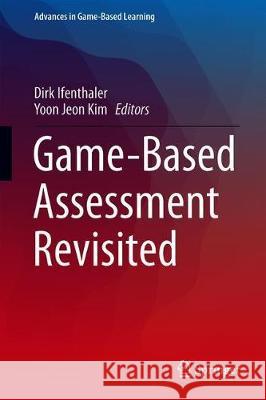Game-Based Assessment Revisited » książka



Game-Based Assessment Revisited
ISBN-13: 9783030155681 / Angielski / Twarda / 2019 / 353 str.
Game-Based Assessment Revisited
ISBN-13: 9783030155681 / Angielski / Twarda / 2019 / 353 str.
(netto: 613,40 VAT: 5%)
Najniższa cena z 30 dni: 616,85
ok. 16-18 dni roboczych.
Darmowa dostawa!
· Part I: What we are measuring in games
· Part II: Assessment beyond games
· Part III: New methods and practices in GBA
· Part IV: Implementations of GBA
· Index of Subjects and TopicsAn open call will be disseminated through listserve announcements. In addition, authors will be invited to contribute to the edited volume through personal messages by the editor. The final contributing authors will be selected in a two-phase process. First, authors are invited to submit a proposal summarizing the proposed chapter and overall fit to the book’s theme. Second, selected authors are invited to submit full chapter manuscripts. Proposals and chapters will undergo a blind-review process. Those who will be invited to contribute a chapter include:
Name
Affiliation
Francesco Bellotti
University of Genoa, Italy
franz@elios.unige.it
Greg ChungUCLA, CRESST
chung@cresst.orgDouglas B. Clark
Vanderbilt University, USA
doug.clark@vanderbilt.edu
Alessandro De Gloria
University of Genoa, Italy
adg@elios.unige.it
Aroutis Foster
Drexel University, USA
aroutis@drexel.edu
Manuel Gentile
ITD-CNR, Italy
manuel.gentile@itd.cnr.it
David Gibson
Curtin University, Australia
david.c.gibson@curtin.edu.a u
Fengfeng Ke
Florida State University, USA
fke@admin.fsu.edu
Christian Sebastian Loh
Southern Illinois University, USA
csloh@siu.edu
Robert J. Mislevy
Educational Testing Service,USA
rmislevy@ets.org
Brett E. Shelton
Boise State University, USA
brettshelton@boisestate.ed u
Valerie Shute
Florida State University, USA
vshute@fsu.edu
P. G. Schrader
University of Nevada, USA
pg.schrader@unlv.edu
Remco Veltkamp
University of Utrecht, The Netherlands
R.C.Veltkamp@uu.nl
Eric Klopfer
MIT, USA
klopfer@mit.edu
11
12
David Gagnon
Field Day Lab, University of Wisconsin, USA
david.gagnon@wisc.edu
Jodi Asbell-Clarke
TERC, USA
jodi_asbell-clarke@terc.edu
Elizabeth Rowe
TERC, USAelizabeth_rowe@terc.edu
Kevin Miklasz
BrainPOP, USA
kevinm@brainpop.com
Liz Owen
Age of Learning, USA
v.elizabeth.owen@gmail.co m
Kristin Dicerbo
Pearson, USA
kristen.dicerbo@pearson.co
m
Nathan Holbert
Teachers College, Columbia University, USA
nrh2118@tc.columbia.edu
Scott Warren
University of North Texas, USA
scott.warren@unt.edu
Malcolm Bauer,
Educational Testing Service,
USA
mbauer@ets.org
Dirk Ifenthaler is Professor and Chair of Learning, Design and Technology at University of Mannheim, Germany and UNESCO Deputy Chair of Data Science in Higher Education Learning and Teaching at Curtin University, Australia. His previous roles include Professor and Director, Centre for Research in Digital Learning at Deakin University, Australia, Manager of Applied Research and Learning Analytics at Open Universities, Australia, and Professor for Applied Teaching and Learning Research at the University of Potsdam, Germany. He was a 2012 Fulbright Scholar-in-Residence at the Jeannine Rainbolt College of Education, at the University of Oklahoma, USA. Dirk’s research focuses on the intersection of cognitive psychology, educational technology, data analytics, and organisational learning. His research outcomes include numerous co-authored books, book series, book chapters, journal articles, and international conference papers, as well as successful grant funding in Australia, Germany, and USA.
Yoon Jeon Kim is a research scientist at the Teaching Systems Lab. Yoon Jeon’s research centers on the design and development of learning and assessment in technology-rich environments, particularly video games and simulations. She also has been working closely with teachers co-designing curricula that incorporate emerging technologies within STEM domains for the purpose of supporting “21st Century Skills” such as systems thinking and science inquiry.
The capabilities and possibilities of emerging game-based learning technologies bring about a new perspective of learning and instruction. This, in turn, necessitates alternative ways to assess the kinds of learning that are taking place in the game-based environments. The field has been broadening the focus of assessment in game environments (i.e., what we measure), developing processes and methodologies that go beyond psychometrics practices (i.e., how we go about assessment in games), and implementing the game-based assessment (GBA) in real contexts. The current state of the field calls for a revisit of this topic to understand what we have learned from the research on this topic, and how the GBA work changed how the field thinks about assessment beyond game environments. Accordingly, this comprehensive volume covers the current state of research, methodology, and technology of game-based assessment. It features four major themes: what we are measuring in games, how GBA has influenced how people do assessment beyond games, new methods and practices, and implementations of GBA. The audience for this volume includes researchers, graduate students, teachers, and professional practitioners in the areas of education, instructional design, educational psychology, academic and organizational development, and instructional technology.
- Explores and expounds upon advances in design, implementation and assessment strategies for game-based learning;
- Showcases international collaborations and current perspectives on assessment in game-based learning;
- Offers descriptive case studies showing innovative approaches of game-based assessment.
1997-2026 DolnySlask.com Agencja Internetowa
KrainaKsiazek.PL - Księgarnia Internetowa









